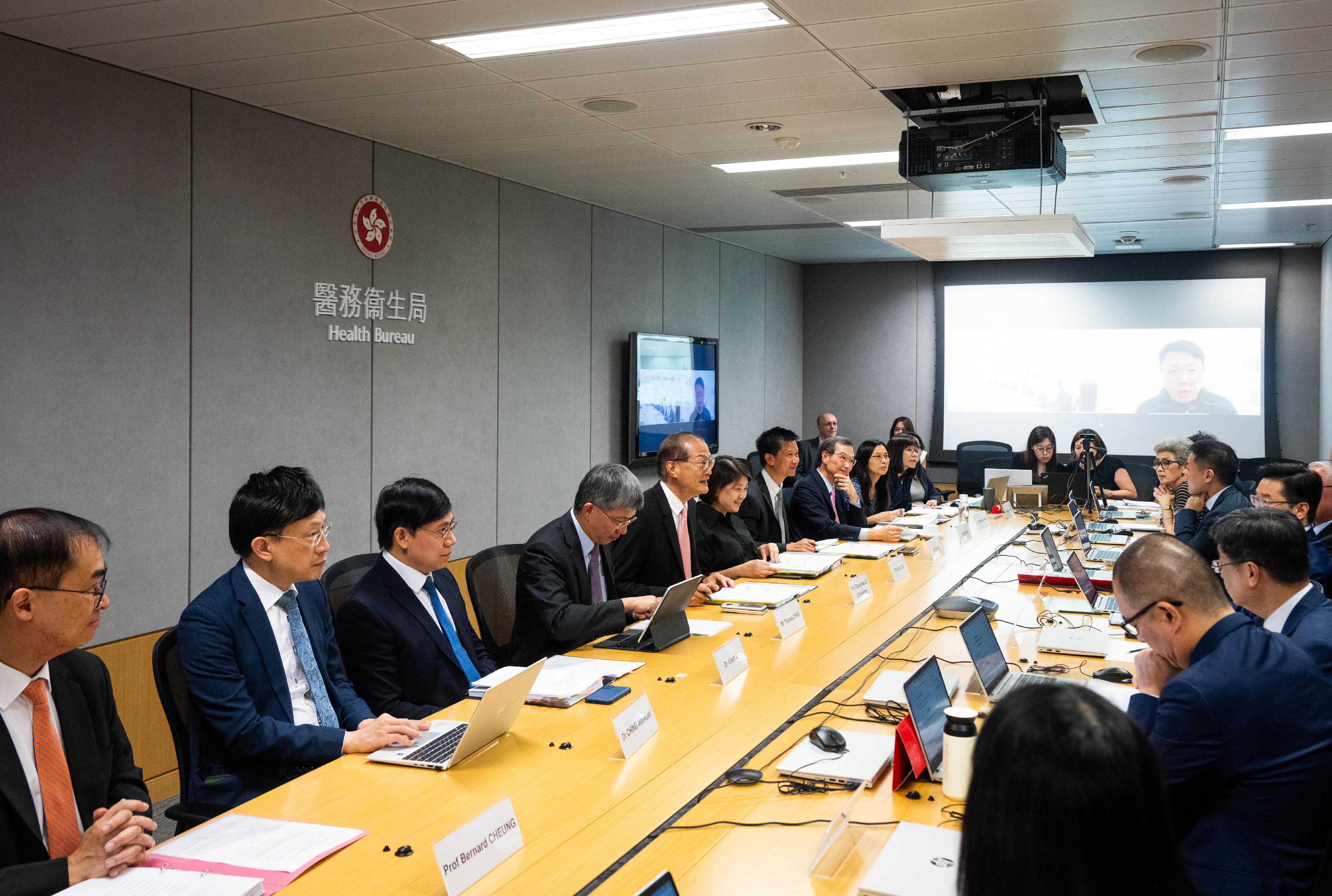Secretary for Health chairs 28th meeting of Research Council under Health Bureau (with photos)
The Secretary for Health, Professor Lo Chung-mau, chaired the 28th meeting of the Research Council (RC) under the Health Bureau today (September 13) to review the research translation outcome of the Health and Medical Research Fund (HMRF), discuss the research translation strategy and consider the funding applications for investigator-initiated research projects received during the period from last December to March this year.
Professor Lo said, "Through the provision of funding support for local medical and health-related research projects and training programmes, the HMRF has been adhering to its clear and unique position and mission to facilitate the application of local research outcomes in the formulation of healthcare policies, strengthening the healthcare system, enhancing healthcare services and promoting a healthy lifestyle for the public, thereby achieving the ultimate goal of improving citizens' health."
He stressed, "The HMRF attaches great importance to the translational value of the funded projects, and they have been yielding fruitful results in translating research into practice. Many funded projects were seen to have brought about positive influence on healthcare policies and practices. Researchers were effectively supported to create new knowledge in the biomedical and healthcare realm, and some of them were thereby able to secure additional funding for further development or implementation of their findings. I am also thrilled about the industrialisation potential of some HMRF-funded projects that were granted patents and licence fees. Spin-out companies were also established for individual HMRF-funded projects to raise funds with the goal of industrialising the research findings."
The RC was pleased to note the significant translation results and impacts of the HMRF-funded researches as revealed from the surveys conducted on 145 research projects and technology/knowledge transfer offices of universities in 2024. These include:
(i) 78 per cent of the funded projects had their research findings published in peer-reviewed journals, showcasing that the HMRF is effective in supporting knowledge generation;
(ii) 42 per cent of the funded projects received additional funding for further research, with each project receiving an additional funding amounting to five times that of the HMRF grant on average;
(iii) The HMRF-funded projects have filed 162 patent applications in different places (including the Mainland, Hong Kong, Europe, the United States and Japan), established 15 spin-out companies/ joint ventures/ incubation programmes and signed 11 collaboration agreements of various types, showcasing the industrialisation potential of these funded projects; and
(iv) In terms of application in the formulation of healthcare policies and practices, one of the government-commissioned research projects funded by HMRF successfully developed the sewage testing approach for quantitative detection of SARS-CoV-2, providing an important indicator for the Government to keep track of the virus activity in the community during the COVID-19 epidemic. Relevant testing approach has been incorporated into the Government's routine Territory-wide Sewage Surveillance Programme, with the scope of sewage surveillance to be expanded to cover other infectious diseases such as seasonal influenza. This testing approach was further enhanced and adopted outside Hong Kong. Furthermore, the results of a longitudinal study on latent tuberculosis infection (LTBI) screening found that repeated LTBI testing might be excessive for individuals living with Human Immunodeficiency Virus (HIV). Such results were cited in the Recommendations on the Management of HIV and Tuberculosis Coinfection put forward by the Centre for Health Protection of the Department of Health as guidelines.
At the meeting, the RC also discussed the newly proposed research translation strategy covering four priorities, namely: (i) to shape research translation culture; (ii) to build quality partnership; (iii) to promote end-of-grant translation; and (iv) to monitor and evaluate research outcomes. The newly proposed research translation strategy spans the entire research cycle, with a view to further enhancing the practical and translational value of the HMRF-funded researches.
Moreover, the RC considered the funding applications for investigator-initiated research projects under the HMRF received from last December to March this year and endorsed a funding commitment of $184 million involving 166 projects. The exact details will be released to the applicants in late September.
Professor Lo added, "With our commitment to supporting scientific research and innovation through the HMRF, the Government pledges to keep enhancing the breadth and depth of the research-driven culture to encourage the healthcare research sector to unleash new quality productive forces. We hope that researchers will continue to leverage the HMRF to amplify the value of their research projects into full play and usher in considerable and sustainable positive impacts on the community with their research outcomes. The HMRF will also support researchers in nurturing emerging and future industries that embrace Hong Kong's competitive edge to contribute to the city's development into an international health and medical innovation hub."
Chaired by the Secretary for Health, the Research Council comprises members including representatives and professors from two medical schools and healthcare-related disciplines of various universities as well as representatives from the Innovation, Technology and Industry Bureau, the Department of Health, the University Grants Committee and the Hospital Authority. The Research Council provides strategic steer on funding for health and medical researches and health promotion projects and oversees the administration of the HMRF, including the allocation of funding for approved projects.

